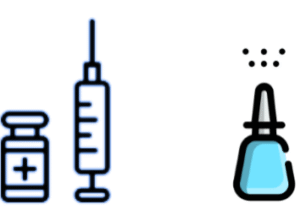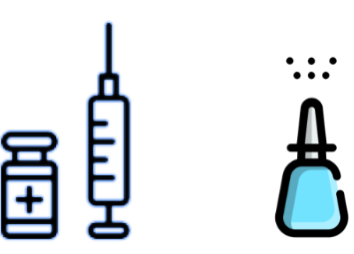 Is There a Difference Between Ketamine and Esketamine (Spravato) for Depression?
Is There a Difference Between Ketamine and Esketamine (Spravato) for Depression?
The discovery of ketamine’s and esketamine’s rapid antidepressant effects has been called the greatest breakthrough for depression research in the last 60 years. There is a big debate about whether there is a significant clinical difference between the two forms: racemic ketamine (used off-label for depression) in an intravenous (IV) or intramuscular (IM) and esketamine (an FDA-approved nasal spray, Spravato).
Here’s a breakdown of the key points on the difference in efficacy and safety:
Efficacy: The Jury is Still Out, “we don’t know which is better”
- Real-World Data: Several observational studies comparing intravenous ketamine and intranasal esketamine for treatment-resistant depression (TRD) have had mixed results.
- A recent report from McLean Hospital found that patients on intravenous ketamine had slightly greater symptom improvement (49.2%) compared to those on intranasal esketamine (39.6%), but remission and response were not reported, and this was not a controlled trial.
- A study at Yale found that the ketamine group had slightly better symptom improvements for depression, though there was no difference in the patient response or remission rates.
- A Mayo study found no difference in depression severity change or response/remission rates, but time to remission was faster for intravenous ketamine.
- Confounding Factors: A critical weakness of these real-world studies is that patients were not randomly assigned.
- Socioeconomic Status is a likely confounder in these studies, as esketamine has broad insurance coverage, and ketamine is not covered, so by default the patients receiving ketamine likely had higher socioeconomic status (not reported in these studies); higher socioeconomic status is independently linked to better health outcomes.
- Randomized Trial: The only randomized trial comparing the two treatments found no differences in remission or response rates after a single dose (the problem in this study was that IV esketamine was used).
An Upcoming Study might help us know the answer to this question. A well-powered comparative effectiveness study which started in January 2025 (NCT06713616) is ongoing, but definitive results are not expected until 2028 at the earliest.
Safety: A Logistical Difference
From a public health and logistical perspective, esketamine is demonstrably safer due to FDA regulations.
- REMS Program: FDA-approved esketamine is subject to a strict Risk and Evaluation Mitigation Strategy (REMS) program.
- This program prohibits take-home dosing and limits the dose and frequency of exposure.
- This strict oversight means esketamine abuse rates are extremely low and have not measurably changed, while ketamine abuse rates have steadily risen over the last 8-10 years.
- Off-Label Ketamine: Ketamine is used off-label for psychiatric illness and is not subject to REMS requirements.
- This is a regulatory “loophole” which allows for the use of ketamine regimens with doses that may be more than 3 times the maximum esketamine dose or even daily dosing, increasing the risk of adverse effects.
- Reports of at-home use of racemic ketamine have become more prominent.
- Neurotoxicity: Dose, frequency, and cumulative exposure are key factors in the risk of neurotoxicity, which has been documented in human ketamine misuse. The esketamine REMS program protects against this by limiting exposure.
Conclusion
While both ketamine and esketamine can be helpful in managing depression, genuine uncertainty remains regarding which is more effective, however, the regulatory framework makes esketamine safer from a public health standpoint.
Want to know if these treatments or others are right for you? Schedule a consultation with one of our physicians.
Come see any of our licensed Clinicians who accept Medicare at our 5 locations to learn more!: https://hopeforyourbrain.com/
Synaptic Psych – Brentwood Clinic is located at 5300 Maryland Way Ste 103, Brentwood TN 37027 – Welcome to Synaptic Psych’s Brentwood clinic, where compassionate, cutting-edge mental health care meets the heart of Williamson County. We serve Brentwood, Nolensville, Antioch, and beyond!
Synaptic Psych – Franklin Clinic is located at 381 Riverside Dr Suite 460, Franklin, TN 37064 – Welcome to Synaptic Psych’s Brentwood clinic, where compassionate, cutting-edge mental health care meets the heart of Williamson County. We serve Brentwood, Nolensville, Antioch, and beyond! Our expert team of Brentwood Psychiatrists offers a full spectrum of behavioral health services
Synaptic Psych – Nashville Clinic is located at 2125 Belcourt Ave, Nashville, TN 37212. – Welcome to Synaptic Psych’s Nashville clinic, where compassionate, cutting-edge mental health care meets the heart of Davidson County. We serve Nashville, West End, Vanderbilt, Belmont, Lipscomb and beyond! Our expert team of Nashville Psychiatrists and Nashville Child Psychiatrists offers a full spectrum of behavioral health services.
Synaptic Psych – East Nashville Clinic is located at 3800 Gallatin Pike, Nashville TN 37216 – Welcome to Synaptic Psych’s East Nashville clinic, where compassionate, cutting-edge mental health care meets the heart of Davidson County. We serve East Nashville, Inglewood, Madison, Goodletsville, Hendersonville, and beyond! Our expert team of East Nashville and Inglewood Psychiatrists offers a full spectrum of behavioral health services.
Synaptic Psych – 871 Ridgeway Loop Road, Suite 108 Memphis TN 38120 – Welcome to Synaptic Psych’s Memphis clinic, where compassionate, cutting-edge mental health care meets the heart of Shelby County. We serve Memphis, Germantown, and beyond! Our expert team of Memphis and Germantown Psychiatrists and behavioral health experts offers a full spectrum of behavioral health services.
Blog based upon Wilkinson ST, Rhee TG. Ketamine and esketamine: is there a meaningful clinical difference? J Clin Psychiatry 2025;86(4):25com16003.

